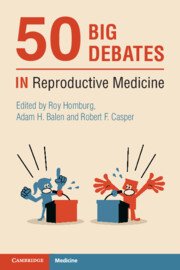Book contents
- 50 Big Debates in Reproductive Medicine
- Series page
- 50 Big Debates in Reproductive Medicine
- Copyright page
- Contents
- Contributors
- Foreword
- Introduction
- Section I Limits for IVF
- Section II IVF Add-ons
- Section III The Best Policy
- Section IV Embryology
- Section V Ethics and Statistics
- Section VI Male-factor Infertility
- Section VII Genetics
- Section VIII Ovarian Stimulation
- Section IX Hormones and the Environment
- 45A Metformin Is an Effective Treatment for Infertility Associated with Anovulatory PCOS
- 45B Metformin Is an Effective Treatment for Infertility Associated with Anovulatory PCOS
- 46A Laparoscopic Ovarian Drilling Should Be Performed for CC-Resistant PCOS
- 46B Laparoscopic Ovarian Drilling Should Be Performed for CC-Resistant PCOS
- 47A Asymptomatic Polycystic Ultrasound Appearance of the Ovary Is Favourable for IVF Outcome
- 47B Asymptomatic Polycystic Ultrasound Appearance of the Ovary Is Favourable for IVF Outcome
- 48A Ultrasound Monitoring Is Not Required for Letrozole Treatment
- 48B Ultrasound Monitoring Is Not Required for Letrozole Treatment
- 49A Progesterone Levels Should Be Measured on the Day of hCG Administration
- 49B Progesterone Levels Should Be Measured on the Day of hCG Administration
- 50A Progesterone Treatment Does Not Help Recurrent Miscarriage Patients
- 50B Progesterone Treatment Does Not Help Recurrent Miscarriage Patients
- 51A The Microbiome Environment Influences IVF Results
- 51B The Microbiome Environment Influences IVF Results
- Index
- References
50A - Progesterone Treatment Does Not Help Recurrent Miscarriage Patients
For
from Section IX - Hormones and the Environment
Published online by Cambridge University Press: 25 November 2021
- 50 Big Debates in Reproductive Medicine
- Series page
- 50 Big Debates in Reproductive Medicine
- Copyright page
- Contents
- Contributors
- Foreword
- Introduction
- Section I Limits for IVF
- Section II IVF Add-ons
- Section III The Best Policy
- Section IV Embryology
- Section V Ethics and Statistics
- Section VI Male-factor Infertility
- Section VII Genetics
- Section VIII Ovarian Stimulation
- Section IX Hormones and the Environment
- 45A Metformin Is an Effective Treatment for Infertility Associated with Anovulatory PCOS
- 45B Metformin Is an Effective Treatment for Infertility Associated with Anovulatory PCOS
- 46A Laparoscopic Ovarian Drilling Should Be Performed for CC-Resistant PCOS
- 46B Laparoscopic Ovarian Drilling Should Be Performed for CC-Resistant PCOS
- 47A Asymptomatic Polycystic Ultrasound Appearance of the Ovary Is Favourable for IVF Outcome
- 47B Asymptomatic Polycystic Ultrasound Appearance of the Ovary Is Favourable for IVF Outcome
- 48A Ultrasound Monitoring Is Not Required for Letrozole Treatment
- 48B Ultrasound Monitoring Is Not Required for Letrozole Treatment
- 49A Progesterone Levels Should Be Measured on the Day of hCG Administration
- 49B Progesterone Levels Should Be Measured on the Day of hCG Administration
- 50A Progesterone Treatment Does Not Help Recurrent Miscarriage Patients
- 50B Progesterone Treatment Does Not Help Recurrent Miscarriage Patients
- 51A The Microbiome Environment Influences IVF Results
- 51B The Microbiome Environment Influences IVF Results
- Index
- References
Summary
Recurrent miscarriage, defined as the loss of three or more consecutive early pregnancies, affects 1-2% of the population. In at least 50% of cases this is due to recurrent fetal aneuploidy. Despite numerous proposed aetiologies (endocrine; immune and anatomical), only obstetric antiphospholid syndrome has withstood critical evaluation over an extended period – 30 years. Progesterone, secreted by the corpus luteum, is recognised to play a cardinal role in early pregnancy. Its actions are mediated through both genomic (via nuclear and membrane bound receptors) and non-genomic mechanisms which include modulation of the maternal immune response, promotion of a TH2 cytokine response and up-regulation of Tissue Factor and PAI-1 activity. A murine knockout model of progesterone receptor A demonstrates impaired endometrial decidualisation and implantation failure. Seminal work by Robert Casper reported that progesterone secretion by the corpus luteum is an absolute requirement for a successful pregnancy. Lutectomy before 8 weeks of pregnancy results in a decrease in progesterone levels and miscarriage. Pregnancy is rescued by the administration of exogenous progesterone. Administration of an anti-progesterone, Mifepristone, leads to pregnancy loss. Progesterone levels are lower in pregnancies that miscarry compared to those that are on-going.
- Type
- Chapter
- Information
- 50 Big Debates in Reproductive Medicine , pp. 259 - 260Publisher: Cambridge University PressPrint publication year: 2021



